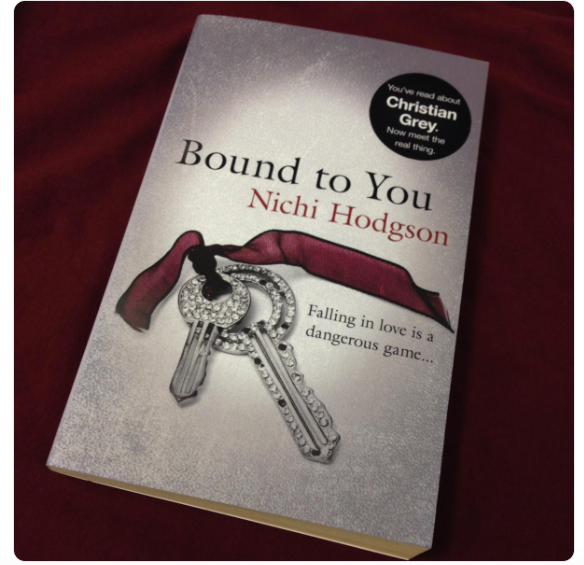I had the pleasure talk to Nichi Hodgson a television journalist at Sky, a BBC presenter, author of books “Bound To You”, and “The Curious History of Dating”. Nichi will host the stage during Sx Tech conference and first German sex-tech hackathon. Can technology help to prevent sexual harassment? How Trump’s sexism affect as all and why sex tech is seeing as the First World Luxury? Let’s follow…

We’re living in a time where the president of an economically leading nation can openly confess to having committed sexual assaults and having said terribly degrading things about women. What consequences does that have on social behavior in society as a whole?
It sets a terrible example — and what is perhaps the worst thing about it is that it has little to no impact on his reputation in the eyes of the most conservative and judgmental voters, the people we would expect to be outraged, while creating an atmosphere of horrific complacence. It means that thousands of other abusers are vindicated by his example, and given confidence that they can get away with their abuses. And it creates a climate of fear for victims.
Can technology help to prevent sexual harassment?
I’m not sure it can just yet. Recognising sexual harassment has taken place is still dependent on someone feeling brave enough to report it so any tech that hopes to ‘record’ harassment would still need that level of human input — unless it was some kind of haptic body sensory device that reacted to being touched and registered the touch as harassment unless you told it otherwise. Any tech that creates registers of information about potential or existing offenders is obviously going to be more controversial and doesn’t allow any room for rehabilitation. And obviously the best way to prevent sexual harassment is not through the threat of exposure but by appealing to someone’s better nature — anything that wields the threat of exposure or bringing to justice outside of the legal system is going to be controversial — so we are a way off being able to design successful products that are culturally acceptable just yet.
You wrote ‘Bound to You’ as your own real-life sex memoir — How does it feel to give away the peace of your privacy, in favour of being judged by public opinion?

It’s funny — at the time, I didn’t think about it too much because I had been writing confessionally about my personal life for a while as a journalist — the book seemed like a natural progression, plus it was reaching an audience of people who didn’t know me, which it was infinitely easier to open myself up to than an audience of people who did. I suppose I only realised the consequences of writing so personally once it formed part of the Google trail on me and I was meeting new people for the first time who had read this stuff about me — in particular dates. I remember going on a date with one guy who had read the book before we met as ‘research’. It completely scuppered us getting to get to know one another in an organic way and I felt really angry afterwards that he had access to so much information, without context, about me (particularly because there was obviously a good dose of poetic licence involved in constructing the book as is always the case with memoir when some of your subjects are still alive). I have always been a very open person but it taught me the value of some things being private. These days I’m much more careful to guard my private life although I will still write personally where I think it’s beneficial to the readers. I just have it in a better balance now. But it’s still annoying when people only remember you for that, and not anything weightier or more boring you’ve done. But then that also makes me realise how important it is to openly write about sex and relationships. The more we do it, the more one day it will cease to shock or titillate everyone who comes into contact with it.
You are a journalist and broadcaster and the host of many sex tech events. Sexbots are a huge topic now. Will humanoid sex robots based on customized design and oftentimes pornographic representations of female anatomy essentially lead to the objectification of women?

We have the representations of femininity we deserve. So anything designed now, which relates to an existing vision, isn’t going to lead to the objectification of women — that’s already happened. Certainly, the popularity of humanoid sex robots could influence the lack of shock we feel when we see highly idealised, pornographical representations of female anatomy — but I’m not convinced they’ll lead to a slippery slope whereby all those that encounter them and then encounter women start treating the women like them. What’s obviously very important is that we don’t only have humanoid pornified bots — which is why supporting, funding and celebrating the people that are making any alternatives to them is so vital. I’d like to see half as much coverage given to the stuff of dreams being created by women — but it’s not as Frankenstein’s monster to look at, and that’s why we don’t. We almost need someone to make something so radical it can’t NOT get attention, just to redress the balance.
In your following book, you dig into the “intriguing history of amorous relationships “. How do you think our romantic lives will change over the years, thanks to tech development?
Well, having worked in the dating app business, I’m not quite yet convinced that apps remain the future of dating. They’ve been here for such a short period of time — Tinder only came out seven years ago — that their rapid growth makes us forget they’re likely on a stop-over en route to the next big dating phenomenon. And while financially we are pouring more and more money into them, culturally, we are growing frustrated with them. Ultimately, unless the apps learn to address those frustrations — the lack of manners online, a creeping sense that the house always wins, their growth will stop — or at least there’ll be a very concerted no-app dating movement, in which matchmakers, coaches and ‘live dating’ events can expand. As emotional and relationship literacy increases, we’ll likely see people better able to manage their relationships too — so I’m positive that the quality of relationships is actually going to increase. Whatever the tech we use, we can’t fundamentally rewire how we make connections and fall in love.
Google now blocks the word “porn” in almost every context. In practice, that means that censorship also blocks results focused on sexual health, business trends, sex work, politics, gender and women topics in general. Where is all this leading to? Maybe soon we will need a license for being allowed to publish books like yours?
Yes, it’s very worrying but I think sooner or later it will force their hand and they will have to devise a more sophisticated way of being able to sift through different kinds of information and imagery — mainly because there’s too much revenue to be lost by not discerning between them. Google is also fundamentally against censoring the internet, so unlike with something like child abuse imagery where there must obviously be a block, I’m confident that there will be more freedom in this area rather than less.
We’re living in a political climate where the sex tech industry is constantly confronted with censorship. When was the last time you thought of the internet as a free space?
I’m not sure I ever have for women, to be honest. I think the level of misogyny on the internet has been a growing problem and that it applies to everything from Twitter abuse to access to porn and positive information about sex. I think men are expected to misuse the internet but for women, the prohibition to so-called x-rated material is greater. Plus there’s the fact that so much of the sex positive content we generate is censored because the key terms are considered ‘rude’. It’s a shame there isn’t more context given to what is automatically blocked, better differentiation between what is really education vs what is titillation.
What has been your favorite sex tech-related topic so far? And why?
My background is the dating industry which I also happen to be pretty cynical about, so I’m always really interested in what the execs say about how we’ll be dating in the next decade — much of which I don’t think people will fully embrace (VR dating, for eg). Given an increased cynicism about how computers can match us, I’m very interested to know how tech will incorporate more sophisticated relationship theory into matching, going forward — if it will.
Sex tech development within the realms of pleasure and entertainment is, in particular, a demand in highly developed countries. What can sex tech offer to the people living in countries that are struck with poverty and low sexual education?
Really good question. I think sex tech can seem like a real First World Luxury — and I guess in countries where female genital mutilation is affecting huge swathes of the female population, devising hi-tech vibrators seems entirely inappropriate (although I’d love to see a product specifically devised to help this).
On S x tech we will also run the first German sex hackathon for startups. What kind of project do you expect here?
Ooh, I have no idea! I’m excited to see. Perhaps more haptic devices, full body sensory things. Since the teledildonic patent expired, I expect more teledildonic innovation — in particular stuff that allows couples to connect across the distance which, to date, hasn’t been much explored.
Between sex toys and videos of real-world sex, female entrepreneurs are changing the game. Why is sex tech important for women?
Because it allows them to offset sexism and misogyny in society through a credible, scientific lens and a sector which men take seriously because they have, to date, owned it. Other spheres like literature, healthcare, therapy have always had a strong female presence and association so it’s important that women are penetrating what has traditionally been a male space. What’s more, this is where some of the major influences on how we will live in the next 20 to 100 years take shape. The idea that women could be removed from that sphere of influence is seriously disconcerting — and another reason why it’s so brilliant that they no longer are.

S x Tech conference will take place on July 1, 2019, in Berlin. It will be the very first event that connects the deep-tech with the sex tech industry. Get your tickets now!





